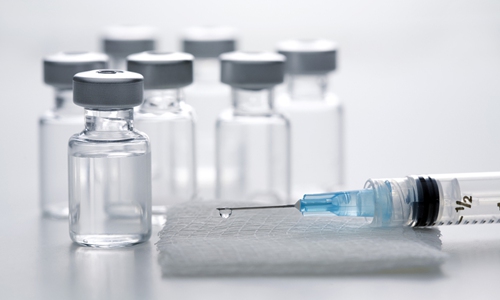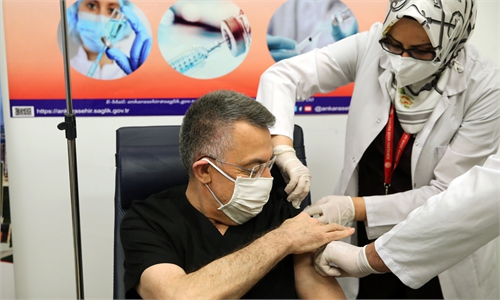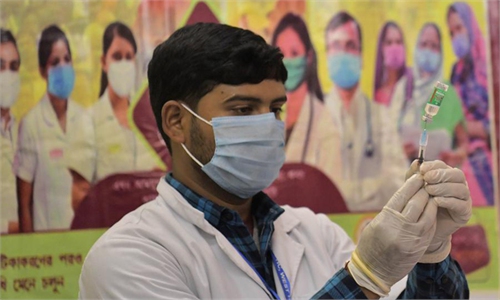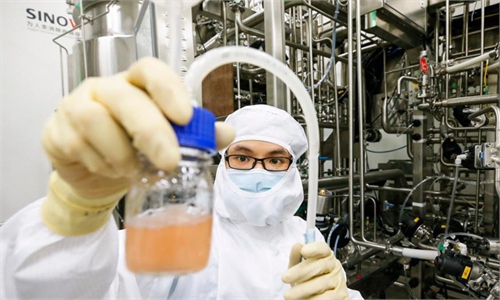Why don't Western countries mention human rights in the distribution of COVID-19 vaccines?

Photo:VCG
World Health Organization (WHO) Director-General Tedros Adhanom Ghebreyesus has again criticized the unfair distribution of COVID-19 vaccines. While many Western developed countries are worried about some residents' reluctance to get vaccinated and the progress is not as expected, more countries are worried about how to get vaccinated.
However, no matter how cruel the reality of this injustice may be, many people who proclaim the supremacy of humanity and human rights have turned a deaf ear to it, leaving countries in need to wait for vaccines.
"The distribution of vaccines is a magic mirror to show which countries really care about human rights," experts said.
How long will the "vaccine race" last in 2021? When will the countries unable to deal with the pandemic get aid fairly?
Late in 2022
Nigeria, Africa's most populous nation, hasn't bought any COVID-19 vaccines. Like many African countries, Nigeria, with a population of more than 200 million, is suffering from a second wave of the pandemic. Nigerian officials expect to have a clear vaccine purchase plan in place by the end of January, due to price and logistics considerations, according to Bloomberg.
In fact, Nigeria is desperate for vaccines. With more than 2,600 health workers infected, many of anti-epidemic frontline staff are exhausted. It has written to the African Union to request 100,000 does of COVID-19 vaccines, and allocated $26 million for licensed vaccine production last week, Reuters reported.
Nigeria had a chance to receive 100,000 doses of Pfizer vaccine this month through COVAX, a program for global equitable access to COVID-19 vaccines led by the WHO. The Nigerian Health Ministry even announced that the president, the vice president and the secretary general of the federal government would be receiving the vaccine live on TV.
It also released a distribution plan, which shows that the whole nation was eagerly waiting for vaccines. But later, it suddenly announced that the vaccines would not arrive at the end of January.
The sudden change is reminiscent of the recent announcement by the US Department of Health and Human Services that there is no stockpile of vaccines to distribute, and many Nigerians are wondering: The vaccine plan can't go wrong, can it? Are we fooled by the US?
"Look at the mess their country is [in] now. Besides, with all the emphasis on 'America First,' Americans can't even vaccinate themselves. How can they give it to us?" a Nigerian police officer Sanda said.
In South Africa, the epidemic is at its peak despite being under control in summer.
Mbuyiseni Ndlozi, a member of the South African Parliament, has suggested on social media to buy exactly one vaccine, copy it and reproduce it. No patents or commercial profits are more worthy than saving lives.
The comments, while pandering to public sentiment, have provoked ridicule online. "How are we going to replicate and manufacture it? We don't even know the formula for the vaccine," a netizen commented.
As far as vaccine availability in South Africa is concerned, Osford-AstraZeneca vaccines manufactured by India are not in place yet, and the countries that ordered Pfizer vaccines are still queuing up around the world.
Earlier this year, some South African media revealed that South Africa could produce 300 million doses of the COVID-19 vaccines for Johnson & Johnson, questioning whether it will be distributed to South Africa.
The public has expressed dissatisfaction with the government's strategy for obtaining vaccines, with many voices focusing on the "vagueness of the strategy and the lack of information on where to get vaccines, when and how much they will cost."
It is difficult for large African countries to get vaccines, and even harder for small countries. However, there is good news as the Seychelles have started using Chinese vaccines, donated by the United Arab Emirates. Egypt is on the verge of mass inoculation with Chinese vaccines, and Guinea has administered the Russian vaccine for 25 people.
Some Asian countries are facing similar difficulties.
"Several countries, especially developed nations, have already started vaccinating their frontline workers against COVID-19. But developing countries like Pakistan still struggle to acquire safe and effective vaccines," Daily Pakistan reported on January 20. Pakistan approved China's Sinopharm COVID-19 vaccine for emergency use on January 18.
The country is getting the AstraZeneca vaccine through both COVAX and private channel, Pakistan's newspaper Dawn reported.
"I personally don't think the vaccine will be available on the market in the next few months," said an official at Pakistan's Food and Drug Administration, who asked not to be named. The reality is that the vaccine will not be available globally and that will probably continue until the end of the second quarter of this year, he noted.
High-income countries have been buying up large tranches of the current and future vaccine doses directly from vaccine suppliers. Middle-income countries are also negotiating for their own supplies. This has left relatively few vaccines for COVAX, US science journal Nature reported in January. Some people in the lowest-income countries might need to wait until at least 2022 to get their vaccines, it said.
In addition, the delivery of vaccines has had to be delayed as pharmaceutical companies struggle to keep up with demand. Nepal is likely to get COVAX vaccine in four months at the earliest, Nepal's Republic newspaper reported.
For many poor countries, the supply of vaccines is just one challenge.
Because vaccines such as Pfizer's require ultra-low temperatures to store, many countries with poor infrastructure do not know how to meet the requirement.
As a result, some media said that Western countries are not only rushing to hoard vaccines, but also ignoring the needs of underdeveloped regions in terms of the logistics of vaccines.
Vaccine nationalism
The EU wants to share its vaccine surplus. EU Health Commissioner Stella Kyriakides said the EU wants to set up a mechanism that would allow the sharing of surplus COVID-19 vaccines, before COVAX is fully operational, which should prioritize the Western Balkans, North Africa and poorer Sub-Saharan African countries, Reuters reported.
COVAX is already operational but has so far struggled to secure vaccines, she said.
Europe, which led the fight against vaccine nationalism last year, is now being criticized around the world for being, along with the US, a "poster child for vaccine nationalism." The EU and its member states have turned the spotlight on Germany.
German magazine Der Spiegel said the German government had ordered 30 million doses of the vaccine separately from German manufacturer BioNtech, outside the EU's joint mechanism, raising the ire of its neighbors. Finally, the European Commission negotiated with Germany, demanding that the 30 million doses be delivered only after a joint EU order was completed.
The EU, with a population of 450 million, has ordered nearly 2.3 billion doses of vaccines from six manufacturers. At two doses per person, there is a considerable surplus.
But for now, it is unlikely that the EU will share some of its vaccines with poor countries. It should be around the third quarter of 2021, when the EU countries have basically completed vaccination for their residents, that the EU may share the vaccines with other countries.
Many European experts accuse the US of irresponsibility for adopting the "America First" policy, because both Pfizer and Moderna vaccines approved by the EU are produced by American companies. But there are very few voices reflecting on Europe's panic purchase of vaccines and stockpiling of resources.
In addition, European public opinion generally believes that vaccines developed in Europe and the US, such as those by Pfizer and Moderna, are expensive and costly for storage and transportation, making them not a good choice for poor countries.
In fact, one can see serious inequality even on the European continent. The Associated Press reported that "When thousands of people across the European Union began rolling up their sleeves last month to get a coronavirus vaccine shot, one corner of the continent was left behind, feeling isolated and abandoned: the Balkans."
Most of the Western Balkans rely on COVAX to obtain vaccines. Since they were unable to get the vaccine, they had to help themselves and each other. Serbia first obtained a small amount of Pfizer and Russian vaccines, but it was far from enough for mass vaccination. When China's first batch of 1 million doses of vaccines arrived in Belgrade on January 16, President Aleksandar Vucic went to the airport to welcome.
When it comes to the "responsibility" of developed countries, Canada is more typical. Not long ago, Canada rejected the WHO's call for vaccine donations. Canada has ordered as many as 414 million doses of vaccine, more than five times the amount needed by its whole population.
"Canadians are divided between wanting to help the world and helping themselves," The Canadian Press reported on January 19, "Ottawa is facing pressure to help poorer countries access COVID-19 vaccines, but it is also being pulled internally by provinces demanding their citizens be vaccinated as quickly as possible." David Hornsby, professor of international affairs at Carleton University, said the pandemic has shed light on an inward-looking trend that has been developing in the country for decades.
Increasing global demand for Chinese and Russian vaccines
"The gap in vaccine distribution between developed and developing countries is huge, and is becoming more and more obvious as a few countries start and accelerate vaccination," Chen Xi, an associate professor of global health policy and economics at Yale University, told the Global Times, "Except for COVAX, no proposals for cooperation between governments of developed and developing countries have been put forward. The WHO director-general therefore emphasized that this is a 'catastrophic moral failure'."
"Vaccine distribution is a magic mirror, showing which countries really care about human rights and which countries just talk about it," Wang Yiwei, director of the Institute of International Affairs of the Renmin University of China, said in an interview with the Global Times on January 20. "The epidemic is a global humanitarian disaster. The practices of Western countries, which have always advertised the supremacy of humanitarianism and human rights, run counter to their principles. They not only grab and stock up anti-epidemic materials, but even in vaccination within their countries, the rich come first."
A Chinese scholar who has been in the UK under an exchange program for a long time told the Global Times that the hypocrisy of Western countries since the outbreak of the epidemic has left a deep impression on her. "They ignore and deny the people of their own countries, let alone caring for people from other countries."
Chen suggests we should make efforts in the following areas to solve the vaccine dilemma. First, developed countries, especially countries whose vaccine reservations far exceed their populations, should provide bilateral and multilateral vaccine assistance to developing countries; second, a variety of vaccine development options are needed, especially vaccines suitable for storage and transportation conditions in developing countries; and third, developing countries can negotiate with major pharmaceutical companies to obtain non-patent applications, and then mass produce in their own countries. India has great potential in this regard.
The Global Times learned from an anonymous source that India is trying to show its image as a major country and its advantages in medical industry supply chain through vaccine exports. However, some analysts think that it may be hard for India to meet the demand because it has to produce vaccines for its large population as well as for exports.
The Financial Times reported on January 19 that Chinese and Russian vaccines are in high demand as world scrambles for doses. Chinese and Russian manufacturers have found that foreign buyers are increasingly interested in their vaccines, while emphasizing that people still have some concerns about Chinese and Russian vaccines.
An article in Tageszeitung junge Welt from Germany noted that for more and more countries, the success in the fight against the epidemic will no longer depend on the leadership of the West, but on cooperation with China. This includes not only countries in Asia, Africa, and South America, but also countries such as Serbia in Europe.



